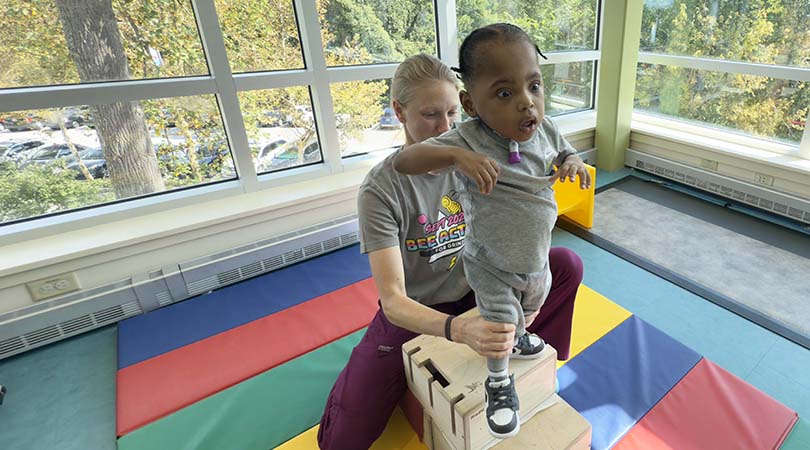News
Therapists to Flex Research Skills at UMMS Clinical Practice Summit

Before Dynamic Movement Intervention (DMI), Ashley Wright wasn't confident on his feet. He gripped nearby furniture and walls for support, but most of the time, he opted to stay in place. His playtime and interactions suffered.
After working with MWPH Physical Therapist MaryEllen Davis, 2-year-old Ashley, who has cerebral palsy, is now walking up steps and even balancing himself across uneven surfaces during his sessions.
"He isn't afraid to stand on his own," his mother, Nichelle Brown, said. "Before, he would immediately drop to the floor the minute that he let go of something."
Brown is overjoyed but isn't surprised at Ashley's progress since he started his treatment at Mercy Medical Center and the University of Maryland Medical Center.
"I knew that they would get him walking," Brown said. "Because I saw their dedication and their patience. It takes a lot of patience working with my son and getting him to where he is now. He wasn't a number to them."
While getting Ashley more mobile was the primary goal, Davis and fellow Physical Therapist Jennifer Bocian were also collecting data to better understand how intensive programs like DMI work. Davis said there isn't a large amount of research on DMI because it is a relatively new treatment technique.
Davis and Bocian are one of 15 teams from the Rehabilitation Services Department presenting work at the upcoming Clinical Practice Summit at the University of Maryland Medical Center.
Davis and Bocian's work not only demonstrates their commitment to patients but also their dedication to continually refining their craft.
All four areas of the Rehabilitation Services Department - Child Life and Therapeutic Recreation, Occupational Therapy, Physical Therapy, Speech Language Pathology -- will be represented by presentations at the summit. They set a record for participation this year.
"We're all very passionate about patient care, and we want to be able to show also that our programs are successful in terms of actually making meaningful change," Davis said. "So it's nice to be able to have objective data that we can show to support and grow programming."
Davis and Bocian are specifically studying how DMI affects "trunk control," or, as Davis explains, a patient's ability to sit up on their own.
Davis cautioned that their trunk control research is still in its early stages, but so far their results have been encouraging.
"It's great for us to get some validation that the programming is helping," Davis said.
Davis said the Rehab Department's participation in the summit also promotes MWPH's work to a broader audience.
"It's a great way to highlight some of the things we have at Mt. Washington. By sharing our data, we can show the community what we're doing and promote our success."
Brown said the trunk control presentation is just another example of the dedication she has seen at MWPH.
"Their energy is amazing. We would get here at 8 a.m. to do the DMI program. And then these same individuals are still here until about 6 p.m. To have that energy all day is amazing," Brown said. "They don't get enough credit for that."
